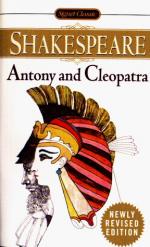|
|
Antony and Cleopatra Act 1, Scene 2
Charmian, a servant to Cleopatra, asks Alexas to call in the Soothsayer, and he does. Charmian gives the soothsayer her palm to read, begging him for a good fortune; he tells her he does not make fortunes, he sees them, and for her he sees that she will outlive Cleopatra. Charmian is happy, taking this to mean long life. She asks him if she will have children, and he says only if wishes had wombs--at this, she tells him to leave, joking that she forgives him for saying this because he is a fool. Iras is next. The soothsayer calls her chaste--at which Charmian scoffs--and says that she has the same fortune as Charmian. She says she would rather it be better than Charmian's fortune, making a bawdy reference to a well-endowed potential husband. The women then turn their attention to Alexas, praying to Isis that he have an infertile wife and die a cuckold, a fortune they joke that he deserves.
Enobarbus, a follower of Antony who has been listening to this conversation, hushes the women and says that Antony is coming. It is Cleopatra instead, however, and she asks if anyone has seen Antony. They haven't, and as she is sending Enobarbus to find him, he arrives. She is upset at Antony's having changed his mind about thinking about love all the time, and leaves with her attendants, without speaking to him. Antony is left alone with the messenger.
The first messenger tells Antony what has happened: Fulvia had fought Antony's brother, Lucius, but soon they united and fought against Caesar. The messenger becomes troubled relating this to Antony, but Antony urges him to continue. He says that Labienus has conquered more territory, but cannot go on; Antony tells him not to hesitate and to speak bluntly, but he cannot, so Antony instructs him to leave.
Second and third messengers arrive, and Antony asks if they are from Sicyon, where he left Fulvia. They leave to get the man from Sicyon; the fourth messenger appears and tells Antony that Fulvia is dead. The messenger leaves Antony alone; Antony contemplates that it was his absence and unfaithfulness that caused her sickness, and feels that he should end his relationship with Cleopatra.
Enobarbus enters, and Antony tells him that they must leave. Enobarbus says that it would be murder to the women to leave, since unkindness from a man means death to them, and then says: "Under a compelling occasion, let women die. It were pity to cast them away for nothing, though between them and a great cause they should be esteemed nothing. Cleopatra, catching but the least noise of this, dies instantly; I have seen her die twenty times upon far poorer moment. I do think there is mettle in death, which commits some loving act upon her, she has such a celerity in dying." Act 1, Scene 2, ll. 144-151 There is a double meaning in this speech; the word "death" also referred to a woman's orgasm. Enobarbus is making a joke about how many times he has seen Cleopatra climax as well as how often he has seen her pine over a man. Antony comments that she must be cunning, but Enobarbus insists that all of her passions and sighs come from real love. Antony wishes he had never seen her, but Enobarbus says that he would have missed something spectacular.
Antony tells Enobarbus of Fulvia's death; Enobarbus tells Antony that she was a wonderful woman and that this tragedy has shown him how the gods work; they have given Antony a replacement in Cleopatra. Antony says that he has to attend to the business that Fulvia has started, and Enobarbus tells him he must stay with Cleopatra. Antony says that he will get Cleopatra's consent to leave, because he must go to Rome. Sextus Pompeius (Pompey) has been attempting to build an empire and poses a threat to Caesar; things are happening for which Antony should not be absent. Enobarbus agrees to tell the people who should know his reasons for leaving quickly.




